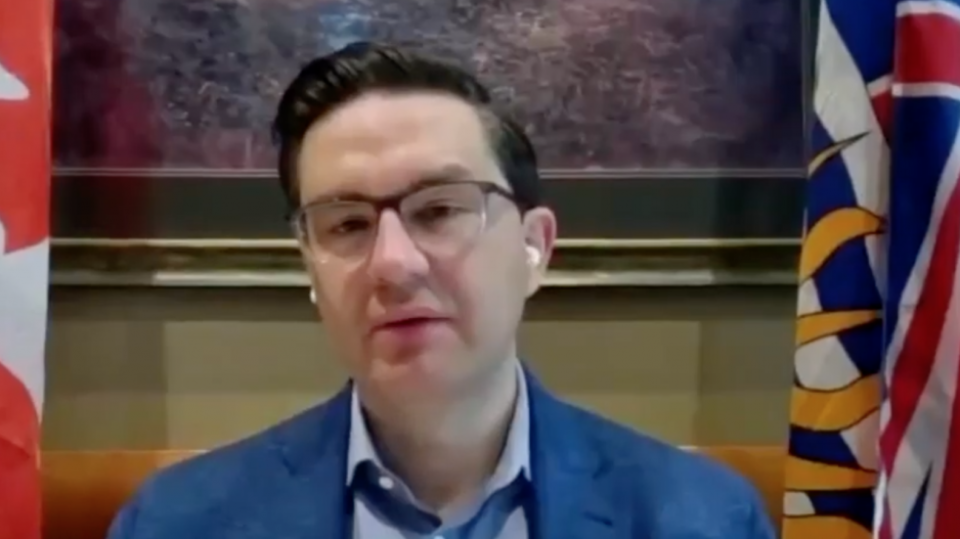Ontario MP Pierre Poilievre has kept a firm grip on his frontrunner status throughout the federal Conservative leadership campaign. Known for his sharp attacks against political opponents, the 43-year-old may find himself leader of the Opposition early next month.
Poilievre, who typically shies away from sit-downs with the press, spent 30 minutes on Zoom early Monday with editors across the Glacier Media chain to talk labour shortages, housing affordability, energy and more.
Ottawa’s tax regime
“We have a system that is complicated and punishes good behaviour,” Poilievre said, adding he would reform the marginal effective tax rate – or METR – to encourage Canadians to work more.
The current tax regime has driven investments to other nations to the tune of $800 billion, he said, citing a 2020 Public Policy Forum report penned by former Bank of Canada governor David Dodge.
“We need to reform our business taxes to incentivize reinvestment, building factories, buying machinery, patenting new technology,” Poilievre said.
“You can imagine why American workers and other foreign workers are able to gain more wage-earning. They have more tools. Their businesses are investing more in machines and technology than ours are. I think part of that is because our system – our tax system – punishes investment and therefore we get less of it.”
The housing crisis
“The problem is that we've been printing money instead of building houses. The federal government flooded the economy with easy cash over the last two years. That boosted demand and the local governments have blocked supply with government gatekeeping,” Poilievre said.
The Conservative leadership candidate would require all federally funded transit stations to have pre-approved permits for high-density housing on surrounding city land. He is also proposing that Ottawa sells 15 per cent of its federal buildings and convert them into housing for young people.
A Poilievre-led government would link federal infrastructure dollars that cities such as Â鶹´«Ã½Ó³»receive to the number of homes completed within their respective borders.
The feds must also expedite immigration for construction workers needed to build homes and lower taxes to allow young people to put more of their income towards mortgage payments, he added.
Addressing labour shortages
Employers who cannot find workers in Canada should be able to sponsor skilled immigrant workers much faster than what the current system allows, according to Poilievre.
“An employer-driven approach will ensure that the real demands on the ground drive decisions rather than the theories of bureaucracy in Ottawa,” he said. “If a construction company is short five workers and they've advertised the jobs [and] can't get them filled, then they should be able to quickly sponsor new immigrants to come first as temporary foreign workers, but then those workers should graduate quickly into permanent residency and eventually citizenship.”
Poilievre said he prefers the Express Entry model geared towards skilled workers but that it should be expanded it to a broader range of occupations.
He would sign deals with the provinces to guarantee that hopeful immigrants would hear a straight yes or no within 60 days of applying to work in Canada.
Poilievre also proposes creating standardized testing for immigrant professionals such as medical doctors. It would be up to provinces to opt in.
“That would allow us to quickly qualify people based on their abilities, not based on where they come from,” Poilievre said, adding he also wants to make it easier for immigrants to begin getting credentialed before they arrive in Canada.
Energy policy
Prime Minister Justin Trudeau has imposed a “top-down, Ottawa-knows-best” approach towards major energy projects, according to Poilievre.
“We need to get the federal government out of the way when there are projects that have the support of First Nations [and] are protecting the environment,” he said, referring to the smaller carbon footprint of liquefied natural gas (LNG) compared with coal exports.
Poilievre said he would ditch 2019’s Impact Assessment Act, Bill C-69, and replace it with legislation done in consultation with First Nations groups.
“With Poilievre as prime minister, you'll have someone who will approve projects and get them done,” he said, adding he wishes to ramp up approvals of LNG projects to help incentivize European markets to buy energy from Canada rather than Russia.
Supply chains
“We do need to speed up the expansion of the Port of Vancouver, make it more efficient, faster so that … goods and services can move quickly in and out of Canada,” Poilievre said.
“Our ports have been jammed for too long and that is due largely to federal incompetence and bureaucratic gatekeeping, and we need to speed up shipping commerce so that we can get our products in and out, and supply our people with affordable goods and more powerful paycheques.”
The media landscape
“My view is that we can support diverse and independent media without the sort of centralized control that the Liberals have imposed in the bailout fund,” Poilievre said, referring to Ottawa’s $595-million salary subsidy program for media organizations.
Earlier this year, the Liberals tabled legislation that would force tech giants like Google and Facebook to compensate new outlets for use of their stories.
Poilievre said he has no problem with a model that allows media to be compensated by these massive companies.
“We just have to make sure that … the government does not discriminate and favour some media over other media. You know, it can't just be liberal media that gets the money,” he said.

